Are you tired of constantly seeing yellow stains on your beautiful countertop? Don’t worry, we have the perfect solution for you!
Turmeric is a vibrant and versatile spice but notorious for leaving stubborn yellow stains, especially on countertops. These stains can be challenging to remove as turmeric’s pigments are highly potent and tend to stick to porous surfaces. Fortunately, with the right techniques and cleaning methods, you can successfully eliminate turmeric stains and restore your countertop’s original appearance. As with any stain removal process, acting quickly and using the right products and methods to prevent further damage is essential.
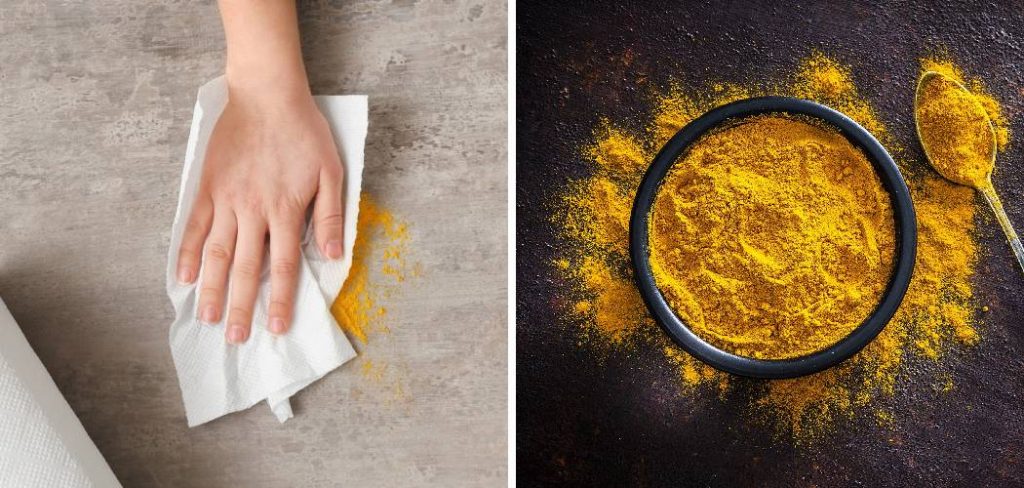
Whether you’re dealing with granite, quartz, or laminate, following these step-by-step instructions on how to remove turmeric stains from countertop can make your cleaning process quick and effective. Let’s get started!
What Are the Causes of Turmeric Stains on Countertop?
Before we dive into the removal process, it’s essential to understand why turmeric stains are challenging to remove.
- Highly Pigmented: Turmeric’s bright yellow color comes from the compound curcumin, which is highly pigmented and can easily stain surfaces.
- Adheres to Porous Surfaces: Countertops made of porous materials such as granite, marble, and concrete are susceptible to turmeric stains as they absorb the pigments.
- Heat Activates Stains: When heated, turmeric stains become more challenging to remove as the heat sets the stain into the surface.
Now that we know what makes turmeric stains stubborn, let’s move on to how you can effectively remove them from your countertop.
What Will You Need?
- Clean cloth or paper towel
- Liquid dish soap
- Baking soda
- White vinegar
- Spray bottle (optional)
- Hydrogen peroxide
- Bowl or container for mixing ingredients
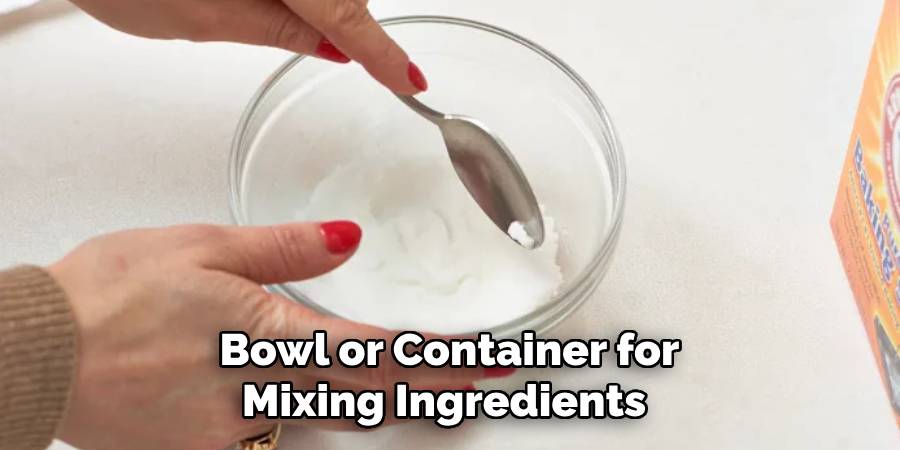
Once you have all your supplies ready, follow these simple steps to remove turmeric stains from the countertop.
9 Easy Steps on How to Remove Turmeric Stains From Countertop
Step 1: Blot the Stain
Use a clean cloth or paper towel to gently blot the stained area. This will help absorb any excess turmeric paste or powder without spreading it further across the countertop. Avoid rubbing the stain, as this can push the pigment more deeply into the surface or spread it to other areas. If the stain is still fresh, blotting is particularly effective in removing as much of the turmeric as possible before it sets into the material. You can use a slightly damp paper towel to soften the residue before blotting for dried stains.
Step 2: Rinse With Warm Water
After blotting the stain, rinse the affected area with warm water. Use a clean sponge or cloth dampened with warm water to wipe the spot gently. This will help lift any loose turmeric particles that may still be on the surface. Ensure that the water is not too hot, as excessive heat can sometimes cause stains to set deeper into certain countertop materials. Be patient and continue rinsing thoroughly, removing all visible powder or paste. For stubborn stains, you can prepare to move to the next steps while leaving the area slightly damp to aid in cleaning.
Step 3: Apply a Cleaning Solution
Prepare a gentle cleaning solution using dish soap and warm water. Mix a few drops of dish soap into a bowl of warm water, creating a soapy solution. Dip a soft cloth or sponge into the mixture and gently scrub the stained area in circular motions. This will help break down any remaining turmeric residue. Avoid using harsh chemicals or abrasive scrubbing materials, as these can damage the surface of your countertop. Rinse the area with clean water after scrubbing to remove any soapy residue, and pat it dry with a clean towel.
Step 4: Use Baking Soda Paste for Persistent Stains
If the stain persists after using the soapy solution, a baking soda paste can be an effective remedy. Mix baking soda with a small amount of water to prepare the paste until it forms a thick, spreadable consistency. Apply the paste directly onto the stained area, ensuring it covers the spot completely. Allow the paste to sit for 10 to 15 minutes, allowing it time to absorb and lift the stain. Once the time has passed, gently scrub the area with a soft cloth or sponge using circular motions. Rinse thoroughly with clean water to remove all traces of baking soda, and dry the surface with a towel.
Step 5: Try Vinegar and Lemon Juice for Stubborn Stains
Vinegar and lemon juice can provide additional cleaning power for particularly stubborn turmeric stains. Combine white vinegar and freshly squeezed lemon juice in a small bowl. Dip a soft cloth or sponge into the solution and gently rub it onto the stained area. The acidity of the mixture helps break down the stain without harming most countertop surfaces. Allow the solution to sit on the stain for 5 to 10 minutes before rinsing with clean water. Wipe the area dry with a towel to prevent any moisture from remaining.
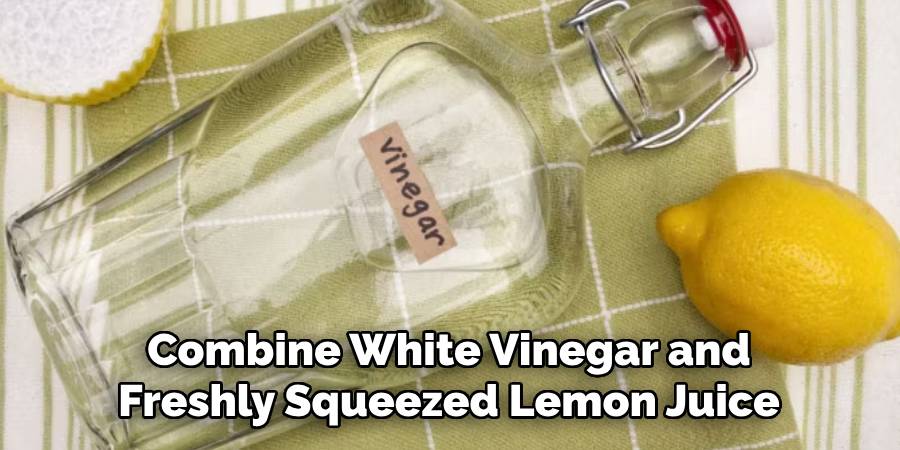
Step 6: Use Hydrogen Peroxide for Persistent Stains
If the stain persists after trying other methods, hydrogen peroxide can be an effective remedy. Apply a small amount of hydrogen peroxide directly to the turmeric stain using a cotton ball or soft cloth. Be cautious when using this method, as hydrogen peroxide has bleaching properties and may affect the color of certain surfaces. Allow the peroxide to sit on the stain for a few minutes, but do not leave it on for too long. Gently scrub the area in circular motions, rinse thoroughly with water, and dry with a clean towel. Always test a small, inconspicuous area before applying hydrogen peroxide to ensure it won’t damage the surface.
Step 7: Try Baking Soda Paste for Stubborn Stains
A baking soda paste can be a helpful alternative for particularly stubborn turmeric stains. Mix baking soda with a small amount of water to form a thick paste. Apply the paste directly to the stain and gently scrub using a soft cloth or sponge. The mild abrasiveness of baking soda helps lift the stain without scratching the surface. After washing, rinse the area thoroughly with water and dry it with a clean towel. Repeat the process if necessary until the stain is removed.
Step 8: Use Stain-Specific Cleaners
If the turmeric stain persists, consider using a stain-specific cleaner designed for the type of surface you’re working with. Many commercial cleaners are formulated to target tough stains and can provide an effective solution. Follow the manufacturer’s instructions carefully to ensure proper application and avoid potential damage to the surface. Always test the cleaner on a small, hidden area first to confirm compatibility. After cleaning, rinse the surface thoroughly with water and dry with a clean, soft cloth to leave it spotless.
Step 9: Prevent Future Stains
To avoid dealing with turmeric stains in the future, take preventative measures such as using protective barriers like placemats, coasters, or cutting boards when handling turmeric-rich foods or spices. Cleaning spills immediately with warm soapy water can also prevent stains from setting. Acting quickly and maintaining proper cleaning habits will save you time and effort in keeping surfaces spotless.
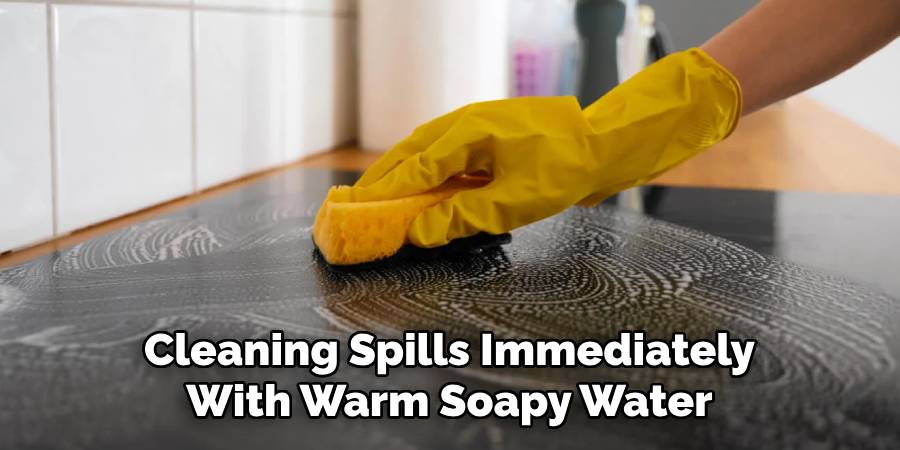
By following these steps and using the appropriate methods, you can successfully remove turmeric stains from your countertops without damaging them.
5 Things You Should Avoid
- Using Abrasive Cleaning Tools: Scrubbing the countertop with steel wool or other abrasive tools can damage the surface, leading to scratches and permanent marks.
- Applying Undiluted Bleach: While bleach is a strong cleaner, using it undiluted can discolor your countertop, especially if it is made of materials like granite or marble.
- Relying on Harsh Chemical Cleaners: Products with harsh chemicals can erode specific countertop finishes, weakening the sealant and making the surface prone to future stains.
- Ignoring the Stain for Too Long: Allowing turmeric stains to sit can make removing them more difficult, as the pigment sets into the countertop over time.
- Using Excessive Water: Over-saturating your countertop with water during cleaning, particularly with porous materials, can cause the stain to spread and seep deeper into the surface.
Can Toothpaste Remove Turmeric Stains?
Toothpaste is often touted as a miracle stain remover, but when it comes to turmeric stains on countertops, toothpaste may not be the best solution. While toothpaste does contain small amounts of abrasive ingredients that can help lift stains, it also has other ingredients like whitening agents that can potentially damage or discolor certain countertop materials.
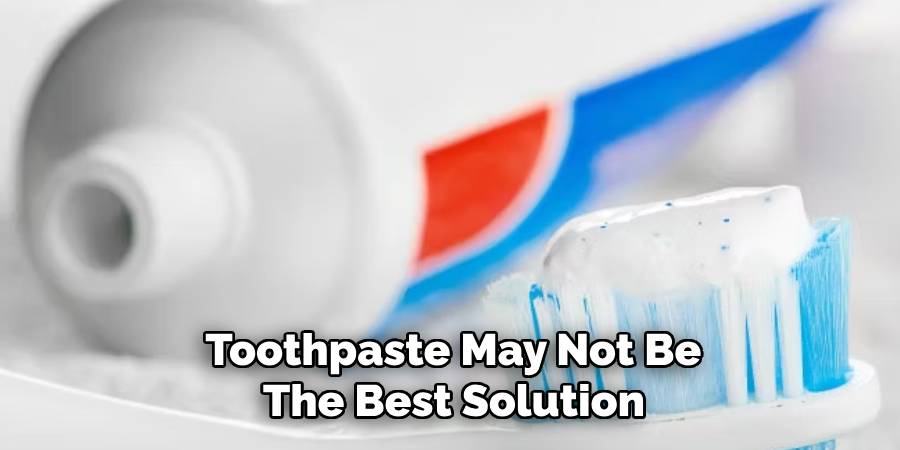
In addition, toothpaste may not be strong enough to remove deep-set turmeric stains fully and may only provide temporary relief. Instead, specialized cleaning products designed for specific countertop materials or natural remedies like lemon juice and baking soda may be more effective in removing turmeric stains.
It’s always essential to test any cleaning method on a small, inconspicuous area of your countertop before applying it to the entire surface. This can help you avoid any potential damage or discoloration from using a product that is too harsh for your countertop material.
Conclusion
How to remove turmeric stains from countertop requires a thoughtful approach to avoid damage while effectively cleaning the surface.
While toothpaste might seem like a quick fix, it is not always the most suitable option due to its potential to cause discoloration or insufficiently address tough stains. Instead, opt for safe and proven methods such as natural remedies like a paste made of baking soda and water or diluted lemon juice, which are less likely to harm your countertop. If these methods don’t suffice, consider using a cleaning product designed specifically for your countertop material. Regardless of your chosen method, always test it on a discreet area first to ensure it doesn’t adversely affect the surface.
By taking the right precautions and utilizing gentle yet effective cleaning techniques, you can successfully remove turmeric stains without compromising the integrity or appearance of your countertop.
Professional Focus
Angela Ervin, a former interior designer turned blogger, specializes in kitchen design and renovations. Through her website, she blends her passion for cooking with design expertise, sharing practical and creative ideas. Known for balancing functionality and beauty, Angela’s insightful content has made her a trusted voice in home design and lifestyle.
About the Author
Angela Ervin, an experienced interior designer and blogger, combines her passion for kitchen renovations with storytelling. Living in Petersburg with her family, she enjoys cooking and testing her projects firsthand. Known for her humor and relatable style, Angela shares creative, functional design insights through her content, making her a trusted voice in home design.
Education History
University: Virginia Commonwealth University
Degree: Bachelor of Fine Arts (BFA) in Interior Design
- Angela’s education at VCU focused on mastering core interior design principles, including spatial planning, color theory, materials selection, and sustainable design practices.
- She gained hands-on experience through studio projects and collaborative design exercises, which honed her ability to create functional and aesthetically pleasing environments.
- Her coursework also emphasized problem-solving and practical applications of design, preparing her for real-world projects like her self-directed kitchen renovations.
- The program’s strong foundation in both technical skills and creative expression shaped Angela’s ability to seamlessly integrate form and function in her work.
